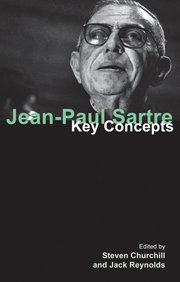Book contents
- Frontmatter
- Contents
- Contributors
- Acknowledgements
- Note on abbreviations
- 1 Introduction: Sartre vivant
- 2 Life and works
- Part I PSYCHOLOGY, PSYCHOANALYSIS AND LITERATURE
- Part II ONTOLOGY: FREEDOM, AUTHENTICITY AND SELF-CREATION
- Part III ETHICS AND POLITICS
- 15 Politics and the engaged intellectual
- 16 Sartre's theory of groups
- 17 Sartre's second or dialectical ethics
- 18 Hope and affirmation: an ethics of reciprocity
- 19 Sartre's legacy
- Bibliography
- Index
19 - Sartre's legacy
from Part III - ETHICS AND POLITICS
- Frontmatter
- Contents
- Contributors
- Acknowledgements
- Note on abbreviations
- 1 Introduction: Sartre vivant
- 2 Life and works
- Part I PSYCHOLOGY, PSYCHOANALYSIS AND LITERATURE
- Part II ONTOLOGY: FREEDOM, AUTHENTICITY AND SELF-CREATION
- Part III ETHICS AND POLITICS
- 15 Politics and the engaged intellectual
- 16 Sartre's theory of groups
- 17 Sartre's second or dialectical ethics
- 18 Hope and affirmation: an ethics of reciprocity
- 19 Sartre's legacy
- Bibliography
- Index
Summary
Shaping and contesting Sartre's legacy
The shaping of Sartre's legacy began while he was still alive. In part, this was due to a concerted effort from Sartre himself, and from Simone de Beauvoir along with others in his inner circle, to pre-empt posthumous evaluations, both positive and negative. In an extended interview with Pierre Vicary and de Beauvoir that was broadcast in early 1975 on ABC radio in Australia, Sartre was asked by Vicary: “How do you want to be remembered? What would you like your epitaph to be? How do you want people to remember the name Jean-Paul Sartre?”. Sartre responded in the following terms:
I would like them to remember [my novel] Nausea, [my plays] No Exit and The Devil and the Good Lord, and then my two philosophical works, more particularly the second one, Critique of Dialectical Reason. Then my essay on Genet, Saint Genet, which I wrote quite a long time ago. If these are remembered, that would be quite an achievement, and I don't ask for more. As a man, if a certain Jean-Paul Sartre is remembered, I would like people to remember the milieu or historical situation in which I lived, how I lived in it, in terms of all the aspirations which I tried to gather up within myself. This is how I would like to be remembered.
(Charlesworth 1975: 154)- Type
- Chapter
- Information
- Jean-Paul SartreKey Concepts, pp. 213 - 228Publisher: Acumen PublishingPrint publication year: 2013



